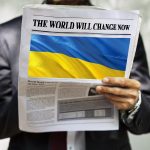THERESA ZETTL
Before reading my article, I would like to emphasize that this blog post is my personal opinion on Alexey Navalny and might not be shared by European Liberals for Reform.
Navalny? Human Rights Award?
Yesterday I have heard in the news that Russian opposition leader Alexey Navalny has won the European Union’s top human rights prize. While reading this I was puzzled. Navalny? Human Rights Award?
As you know, the Kremlin critic was arrested in January after spending five months in Germany while seeking treatment for nerve agent poisoning. He and international leaders laid the blame for the poisoning on the Russian government, a charge since denied by Moscow. Now he is awarded with a prize, which is the European Union’s highest tribute to human rights defenders and awarded with 50,000 €.
From Saul to Paul?
However, what we see here is the change from Saul to Paul as in the biblical story. Forgotten is his right-wing populist and nationalist past. Alexey Navalny joined the populism trend as well by addressing the migration issue.
Let’s go back in time:
His worldview, like most politicians in modern Russia share, was formed under the total dominance of right-wing, market liberal ideology. In 2000, he joined the liberal Yabloko party. In those years, by his own account, he was a classic neoliberal, supporting a regime of low public spending, radical privatization and total freedom for business. However, Navalny soon found a new ideological niche: In the late 2000s, he declared himself a nationalist. He participated in the far-right Russian Marches, waged war on “illegal immigration,” and even launched campaign “Stop Feeding the Caucasus” directed against government subsidies to poor, ethnic minority-populated autonomous regions in the south of the country.
In 2007 a pro-gun rights video was published, in which Navalny presents himself as a “certified nationalist” who wants to exterminate “flies and cockroaches”, while bearded Muslim men appear in cutaways. He whips out a gun and shoots an actor wearing a keffiyeh who tried to “attack” him. The 42-second video was released by the Russian National Liberation Movement, a nationalist group Navalny had just co-founded with Zakhar Prilepin, a renowned novelist who later fought for pro-Russian separatists in southeastern Ukraine and joined a pro-Kremlin socialist party earlier this year.
Kicked out off Russia’s oldest liberal democratic party Yablonko
Shortly before releasing the above mentioned video, Navalny was kicked out of Yabloko, Russia’s oldest liberal democratic party, for his nationalist views and his participation in the Russian March, which is an annual rally of thousands of far-right nationalists, monarchists and white supremacists. Navalny attended the Russian March three times and, in 2011, said that each one was “a significant political event, and there is nothing dangerous about it”. In an extended article titled ‘Without Putinism and Populism’, Yavlinsky, former chairman of Yablonko, stated that Navalny’s anti-corruption investigations had changed little in Russian society. Instead the investigations had only whipped up primitive social hate, and that “promoting class populism in Russia, provoking a confrontation between the poor and rich will not lead to anything good”. For Yavlinsky, Navalny’s politics are a mix of “nationalism” and “populism”.
Given Navalny’s history and his sudden fight for human rights, makes some observers, – myself included – doubt the sincerity of Navalny’s parting with his nationalist past.
“Yes, he got rid of nationalist rhetoric, he founded the Fund to Fight Corruption that has a liberal team and a leftist agenda. So, Amnesty had no real reasons to strip him of his status. But it is a fact that he is a nationalist and xenophobe deep inside,” Nikolay Mitrokhin of Germany’s Bremen University told Al Jazeera. In another interview with a German daily, Navalny said that he still supports anti-migrant measures as stated in articles from 2020. Engelina Tareyeva, who worked with Navalny when he was a member of the liberal Yabloko party before he was expelled in 2007, accused him of routinely using racial slurs and basing his relations with people on their ethnicity. “I consider Aleksei Navalny the most dangerous man in Russia,” Tareyeva has written. “You don’t have to be a genius to understand that the most horrific thing that could happen in our country would be the nationalists coming to power.”
Navalny has also at times seemed insensitive to the historical echoes that words like “deportation” have to some national groups within Russia. Longtime rights activist Lyudmila Alekseyeva attributes some of Navalny’s apparent aggression and prickliness to a lack of experience. “This harsh, even annoyed tone of his characterizes Navalny as an inexperienced politician, because an experienced politician answers any, even the most outrageous,question calmly with a polite smile,” she said. “And he only benefits from doing so.” In 2008, Navalny, like an apparent majority of Russians, supported Russian aggression in Georgia. In 2013, he made illegal immigration from Central Asia a central theme of his campaign for mayor of Moscow. In 2014, after Russia occupied Crimea, he said that, while he opposed the invasion, he did not think that Crimea could be just “handed back” by a post-Putin Russian government.
Last year’s Human Rights award of the European Union winners:
Last year, the human rights prize was awarded to Belarus’s democratic opposition that staged protests against the country’s leader Alexander Lukashenko following a controversial election and fighting against Lukashenko’s dictatorship and censorship. For me these are people who really deserve this price.
Author Profile
-
Co-Founder of European Liberals for Reform
Chairperson of ELfR Working Group Health
ALDE Individual Members Steering Committee Member (2022-2023)
Social Media & Digital Marketing Expert, Blogger
Favorite Topics: Health, Society, LGBTQI
Latest entries
 Elections13/04/2022Presidential elections in France 2022
Elections13/04/2022Presidential elections in France 2022 Human Rights22/03/2022ELfR to support Manifesto for inclusive gender-based violence law
Human Rights22/03/2022ELfR to support Manifesto for inclusive gender-based violence law EU07/03/2022Five possible scenarios for the outcome of the Ukraine war
EU07/03/2022Five possible scenarios for the outcome of the Ukraine war Ukraine06/03/2022ELfR starts petition to nominate Volodymyr Zelenski for Sakharov Prize
Ukraine06/03/2022ELfR starts petition to nominate Volodymyr Zelenski for Sakharov Prize
Post Disclaimer
The opinions expressed by the author of this post do not necessarily represent the opinions and policies of ELfR.

